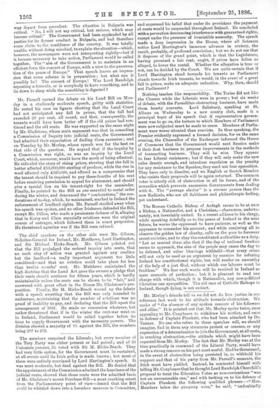Mr. Parnell opened the debate on his Land Bill on
Mon- day in a studiously moderate speech, gritty with statistics. He rested his case on figures showing that the Land Court had not anticipated any fall in prices, that the fall had exceeded 20 per cent, all round, and that, consequently, the tenants would have been better off if the old prices had con- tinued and the old rents. He was supported on the same night by Mr. Gladstone, whose main argument was that in conceding a Commission of Inquiry into judicial rents, the Government had admitted their expectation of finding them excessive ; and on Tuesday by Mr. Morley, whose speech was far the best on that side of the question. He argued that if the inquiry by a Commission was right, so was an inquiry by the Land Court, which, moreover, would have the merit of being effectual. He ridiculed the story of rising prices, showing that the fall in butter affected 216,000,000 sterling of produce, while the rise in wool affected only 2320,000, and offered as a compromise that the tenant should be required to pay three-fourths of his rent before receiving permission to appeal for abatement, and should give a special lien on his tenant-right for the remainder. Finally, he pointed to the Bill as one essential to social order during the winter, and denounced the "confiscations," the con- fiscations of to-day, which, he maintained, marked in Ireland the enforcement of landlord rights. Mr. Parnell strolled away when his speech was spoken, and no other Irishman defended the Bill, except Mr. Dillon, who made a passionate defence of it, alleging that in Kerry and Clare especially evictions were the original source of outrages, which followed them in exact proportion. He threatened agrarian war if the Bill were refused.


































 Previous page
Previous page